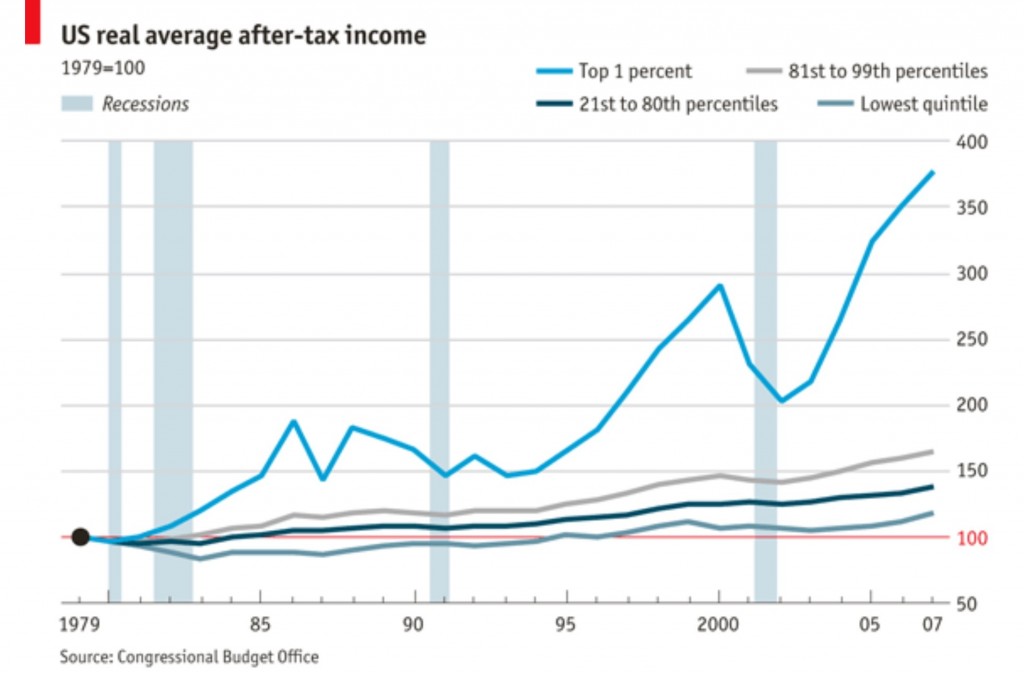In The Terminator, a highly intelligent computer becomes self-aware and starts a nuclear holocaust that wipes out the human race, leaving only a few brave souls left to fight the robot soldiers, impersonated by Arnold Schwarzenegger. The fictional date of this catastrophic event – August 27, 1997 – has long since come and gone without this darkest of technological dystopian coming to pass. Yet, although, we might not fear machines taking our lives the fear that they will take our livelihoods as they encroach on an increasing number of human jobs, is gaining momentum, most recently in a much discussed book by Brynjolfsson and McAfee of MIT. The fear is based on the observation that a growing number of jobs usually thought of as exclusively in the human domain – customer service, care for the elderly, and even driving – are performed by machines or computer software.When computers take over all the jobs, what are we humans going to do? Is this “The End of Work” a phrase popularized in Rifkin’s 1995 book of the same name?
Since Rifkin’s book is nearly 20 year old, history might be a good place to start assessing this claim. The earliest example of fear of job loss from technological development is probably the Luddites of the early 19th century. This group of textile artisans feared the introduction of labor-saving technology brought about by the industrial revolution and took to destroying the new machines at night. It was not until the police violently cracked down on the activists and many of the organizers were executed or sent to the Australian colony that the nightly raids stopped.
A century later a particular subgroup of our workforce was almost completely replaced when mechanization of agriculture made millions of horses redundant. Although the Luddites were put down, their fears have reemerged regularly up until this date and for 200 years the end-of-work has been just around the corner. Rifkin himself predicted a continuously rising rate of unemployment, although even during the current economic malaise, the unemployment rate in Europe and the United States (11.3 and 8.0 percent, respectively, OECD Statistics) is only a little higher than that of 1995 (10.6 and 5.6 percent, respectively). Clearly, we have yet to become horses.
These dark predictions arise from a fundamental misunderstanding of basic economic principles. In a market economy, the price – the wage in the case of the labor market – moves to ensure that supply meets demand and there are few underutilized resources. The problem will therefore not be one of unemployment but one of inequality if not all parts of the labor force are equally prone to replacement by computers. In fact, technological development is often described as a primary cause of the rise of American inequality. The graph below, from The Economist, depicts the rise in inequality since 1979.

It is clear that whereas the lower end of the income distribution has only seen marginal improvements over the past 30 years – there is in fact an active debate as to whether they have gained at all – the higher percentiles have gained substantially. So why do economists think that technological development is a main cause of higher inequality? The answer lies with a recent focus on tasks (see an excellent survey by Autor here and an older piece on the introduction by computers by Alan Krueger here). In this framework, workers are categorized depending on what type of tasks they primarily perform with the two most important categories being: (i) routine manual tasks – cashiers, factory workers, bank tellers etc. – (ii) and non-routine cognitive tasks – authors, scientists, CEOs.
Because routine manual tasks are relatively easily formalized, computers can perform them and workers performing such tasks might be replaceable by machines. Employees performing non-routine cognitive tasks are not easily replaceable and are in fact made more productive by computers, both because they can acquire information more easily and because they can spread their results of their work more easily. This classification turns out to be a strong predictor for whether workers are replaced by technological development and as a consequence of their income potential.
There will therefore always be enough work; the question is whether the resulting market wage is one we are willing to accept as a society. There exists a market wage at which those millions of horses could have been employed, but as this was lower than their feeding costs it was not economical to employ them.
What can we do as a society to prevent technological development from leaving certain parts of society behind? As the Luddites so clearly demonstrated the solution is not to prevent the introduction of machines or new production technology. Imagine if they had had their way; we would still be living as people did in the early 19th century. All technological development causes some disturbances and one of the many side effects of the rigid Southern European labor markets is holding back laborsaving improvements that generally benefit society. The solution must be education and continuous skill upgrading so as to ensure that everyone benefits from technological development and nobody ends up a “horse.”



The main cause of inequality is not the technological development, it is its use by decision makers in a competition and not coevolution economical model.
Concerning education, will it be public or private? Who will pay for the courses? When will the courses been followed (at night?)? What about the courses that does not educate to give predefined answers, but rather to ask the good questions? What about unformatted/out of the box thinking and challenge of some economical theory? Elite Education is not the solution to all society problems, as was proven by the failure of some predictive models…but education could and should help.
the inequality gap is going to widen because of the speed of technology innovation and the speed of population growth. and education can only fill up only so much of that chasm
very interesting post. Thank’s
Interesting to see how this trend plays out in the next twenty years
Great article. The question is very interesting and some countries should think about the future: how to employ people without education? And for other countries, it is not a problem for the future, it is the present…
Totally agree!